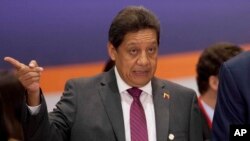Venezuela's oil minister led a delegation in meetings with Saudi Arabian officials Tuesday, following talks in Iran, in an OPEC diplomatic tour as its need for higher oil prices gains urgency.
Suffering from a slowing economy, soaring inflation and shortages, producer Venezuela is among the members of the Organization of the Petroleum Exporting Countries most deeply wounded by the oil price fall.
Its need for OPEC to cut supply to support prices has failed to shift the stance of Saudi Arabia and its Gulf OPEC allies, which are focusing on protecting market share.
Oil Minister Asdrubal Chavez led the delegation that met Saudi Deputy Oil Minister Prince Abdulaziz bin Salman and other officials in Saudi Arabia on Tuesday.
The meeting included discussion of "the Venezuelan proposal for achieving consensus among OPEC countries to reach a joint position on stabilizing the oil market,'' Venezuela's Oil Ministry said in a statement.
Iran's state news agency IRNA reported Tuesday that Chavez had met Iranian Oil Minister Bijan Zanganeh in Tehran for talks that included the prospect of higher Iranian supplies.
"We expect the members of OPEC to pave the ground for [an] increase of Iran's oil production that will reach global markets when sanctions are lifted,'' Zanganeh said during the meeting, the agency reported.
The Venezuelan delegation met Abdulaziz because Saudi Oil Minister Ali al-Naimi was visiting South Korea. No further details were immediately available, and there was no immediate comment from the Saudi government.
The Venezuelan foreign ministry said on its Twitter account Monday that the oil minister, plus Foreign Minister Delcy Rodriguez and Finance Minister Rodolfo Marco Torres, had arrived in Saudi Arabia "to hold bilateral and working meetings.'' It did not elaborate.
Oil prices have almost dropped by half the level they were last June — a drop that deepened after OPEC refused to cut production. The price slide is more painful for countries such as Venezuela and Iran than it is for the wealthier Gulf states.
In January, a diplomatic tour by Venezuelan President Nicolas Maduro to Saudi Arabia, Qatar and Algeria failed to soften the refusal of the Gulf OPEC countries to cut output.
OPEC meets June 5. Iran and a Libyan OPEC official have urged the group to consider output cuts, while Kuwait — in a view expected to be that of the other Gulf OPEC members — has said the policy will remain unchanged.





